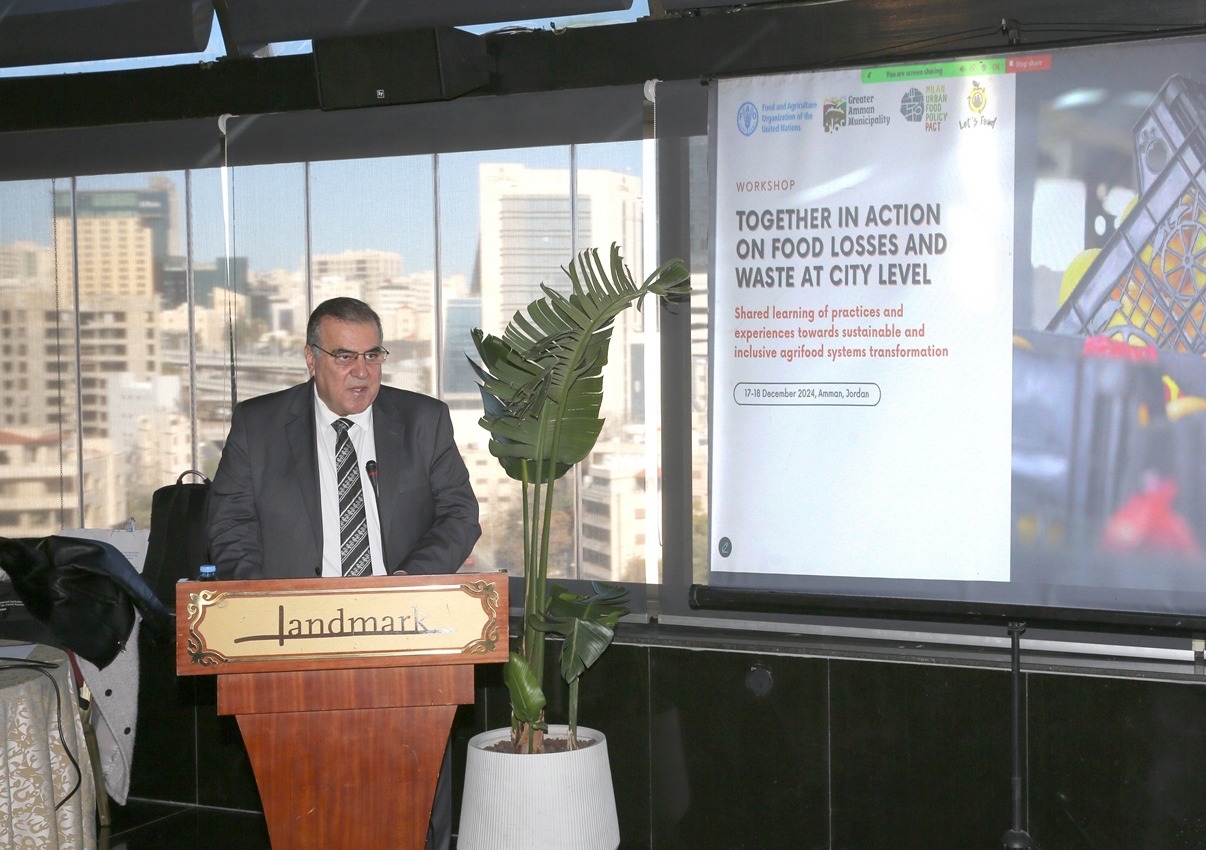Together in Action: A Collaborative Approach to Reducing Food Loss and Waste in Amman

©FAO
The Food and Agriculture Organization of the United Nations (FAO), in collaboration with the Greater Amman Municipality (GAM), the Municipality of Milan, the Milan Urban Food Policy Pact and Let’s Food, launches the first day of a two-day workshop titled “Together in Action on Food Losses and Waste at City Level,” which aims to address the pressing issue of food loss and waste (FLW) in urban areas.
As part of FAO’s Priority Programme “Achieving Sustainable Urban Food Systems” and the South-South and Triangular Cooperation Initiative, the workshop will build on a year-long collaboration between Amman and Milan. The two cities have been exchanging experiences and lessons learned, with Let’s Food facilitating the development of Amman’s food waste management strategy.
The workshop will serve as a platform for sharing best practices, presenting the results of the FLW assessment and strategy for Amman, and discussing the formation of a community of practice to foster ongoing shared learning and collaboration.
“We are committed to building a more sustainable and resilient Amman,” said Eng. Ahamd Malkawi, on behalf of the Mayor of Amman. “By reducing food waste and adopting sustainable food practices, we can improve the quality of life for our citizens and protect our environment.”
On behalf of the Minister of Agriculture, Secretary-General Eng. Mohammed Al-Hayari said, “In the context of food waste, the “No Food Waste” initiative, launched by the Food Security Council in cooperation with the World Food Programme and the FAO at the end of 2022, came as a practical step to address these challenges. The initiative aims to reduce food loss and waste by raising community awareness, promoting sustainable consumption practices, and working to improve the efficiency of food supply chains in various sectors.”
“Greater Amman Municipality can by reducing food loss and waste, we can contribute to a more sustainable future, mitigate climate change, and ensure food security for all,” said Nabil Assaf, FAO Representative in Jordan. “This workshop is a crucial step towards achieving these goals, and we are excited to collaborate with our partners to drive positive change.”
By addressing FLW, Amman aims to enhance its urban food systems, reduce environmental impact, and improve food security. The workshop will provide a valuable opportunity to identify innovative solutions, strengthen partnerships, and promote sustainable consumption and production practices.
"Since its launch in 2015, the Milan Urban Food Policy Pact has grown to include over 300 cities. This joint effort has opened up new opportunities for sustainable urban food system development," noted Giuseppe Sala, Mayor of Milan and Chair of the MUFPP. "The collaboration with Amman - which joined the Pact in 2023 - highlights the powerful impact that collaborative work can have on such a crucial and cross-cutting issue as food loss and waste. Working with international agencies as FAO further enhances its potential and Amman is a great example of this. The MUFPP amplifies the voices of cities within
international organizations, and we will continue to advocate globally for the pivotal role of cities in the transition to more sustainable urban food systems. We invite cities to join the Pact and engage in this ongoing exchange of peer learning across diverse geographical contexts, communities, and dimensions, sharing tools and knowledge to tackle our global challenges."
“South-South and Triangular Cooperation serves as a dynamic platform for fostering innovative, locally tailored solutions. This partnership bridges knowledge and experience, with Milan sharing its proven expertise in food loss and waste management and Amman adapting these practices to suit its unique urban landscape” said Mr Anping Ye, Director, South-South and Triangular Cooperation Division, FAO.
“Collaboration between different levels of governments and non-state actors can make the real difference in transforming agrifood systems to become more efficient, sustainable, inclusive and resilient,” said Deputy Director, Agrifood Systems and Food Safety Division, FAO.” I am glad that the food waste management strategy for the Greater Amman Municipality has been developed in a participatory way engaging multiple actors and levels of governments. It is now time to think how the strategy can be better integrated within the Amman Municipality planning systems and aligned with the national policy and regulatory frameworks. At FAO, we look forward to helping support local and national actors in these efforts” he added.
